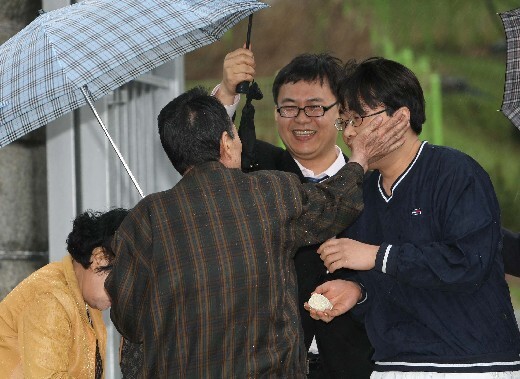hankyoreh
Links to other country sites 다른 나라 사이트 링크
S. Korea acquits Internet pundit “Minerva”

Park Dae-sung, who posted economic views anonymously under the pen name “Minerva,” was acquitted in a case where he had been charged with not only deliberately spreading false rumors about government policy on the exchange rate, but also with the intention to harm the public good by negatively affecting the foreign exchange market and undermining the nation’s economic credibility. This case has created controversy leading to accusations that the government is attacking the freedom of expression.
On April 20, Judge Yu Yeong-hyeon of the Seoul Central District Court found Park not guilty of violating the Basic Law on Electronic Commerce. Arrested on January 10, the 31-year-old man was released later in the evening from the Seoul Detention Center.
Park posted his commentary on the “Agora” debate section of Daum, a South Korean portal site. Authorities drew attention to two posts in particular. On July 30 of last year, he blogged that the government would stop exchanging its funds in foreign currency by August 1, 2008. On December 29, he said the government had prohibited seven financial institutions from buying dollars.
At the time, the prosecution said the situation had grown “to the point where as many as hundreds of thousands are reading his posts and following him like he was the economic president,” and that he deliberately tried to hurt public interests by lying.
The court, however, determined that he was innocent, saying it found no evidence indicating Park’s actions had been taken with the intention of hurting the interests of the South Korean public or that he “entirely knew his writings to be false, even if he used exaggerated and unrefined expressions.”
Regarding his July 2008 post, the court sided with the prosecution which said that the government stopped exchanging its currency because of a fall in the earnings rate on banks’ exchange equalization funds, and not for a lack of foreign currency reserves. Nonetheless, because it was true that the government stopped exchanging its dollars and that its foreign currency reserves were shrinking, Park could not be found to have violated the law.
Regarding his December 2008 post, the court noted that it was “already widely known the Ministry of Strategy and Finance had called on financial institutions to refrain from purchasing dollars.” They also determined that Park himself had since apologized and removed his posting, and that given the unique characteristics of both the foreign currency market and internet debate sites, there was no evidence suggesting he deliberately tried to hurt the public good.
The court did, however, reject Park’s petition to the court asking that it have the Constitutional Court determine whether the law he was accused of violating is unconstitutional. The law on electronic communication, which prohibits spreading of false information with intent to harm the public interest, carries a maximum sentence of five years in prison or up to 50 million Won. Park alleges the law is unconstitutional.
Park’s legal representative, Kim Gab-bae, said the judgment “demands strict proof” in establishing “intent to harm the public interest.” He added, “It looks like the court was aware of how the case relates to the freedom of expression and of the problems inherent in the law.”
Prosecutors, who had sought an 18-month prison sentence, say they plan to appeal the decision.
Please direct questions or comments to [englishhani@hani.co.kr]
Editorial・opinion
![[Column] Park Geun-hye déjà vu in Yoon Suk-yeol [Column] Park Geun-hye déjà vu in Yoon Suk-yeol](https://flexible.img.hani.co.kr/flexible/normal/500/300/imgdb/original/2024/0424/651713945113788.jpg) [Column] Park Geun-hye déjà vu in Yoon Suk-yeol
[Column] Park Geun-hye déjà vu in Yoon Suk-yeol![[Editorial] New weight of N. Korea’s nuclear threats makes dialogue all the more urgent [Editorial] New weight of N. Korea’s nuclear threats makes dialogue all the more urgent](https://flexible.img.hani.co.kr/flexible/normal/500/300/imgdb/original/2024/0424/7317139454662664.jpg) [Editorial] New weight of N. Korea’s nuclear threats makes dialogue all the more urgent
[Editorial] New weight of N. Korea’s nuclear threats makes dialogue all the more urgent- [Guest essay] The real reason Korea’s new right wants to dub Rhee a founding father
- [Column] ‘Choson’: Is it time we start referring to N. Korea in its own terms?
- [Editorial] Japan’s rewriting of history with Korea has gone too far
- [Column] The president’s questionable capacity for dialogue
- [Column] Are chaebol firms just pizza pies for families to divvy up as they please?
- [Column] Has Korea, too, crossed the Rubicon on China?
- [Correspondent’s column] In Japan’s alliance with US, echoes of its past alliances with UK
- [Editorial] Does Yoon think the Korean public is wrong?
Most viewed articles
- 1‘We must say no’: Seoul defense chief on Korean, USFK involvement in hypothetical Taiwan crisis
- 2N. Korean delegation’s trip to Iran shows how Pyongyang is leveraging ties with Moscow
- 3‘Weddingflation’ breaks the bank for Korean couples-to-be
- 4Korea sees more deaths than births for 52nd consecutive month in February
- 546% of cases of violence against women in Korea perpetrated by intimate partner, study finds
- 6Will NewJeans end up collateral damage in internal feud at K-pop juggernaut Hybe?
- 7[Column] Park Geun-hye déjà vu in Yoon Suk-yeol
- 8[Editorial] New weight of N. Korea’s nuclear threats makes dialogue all the more urgent
- 9Amnesty notes ‘erosion’ of freedom of expression in Korea in annual human rights report
- 10“Parental care contracts” increasingly common in South Korea